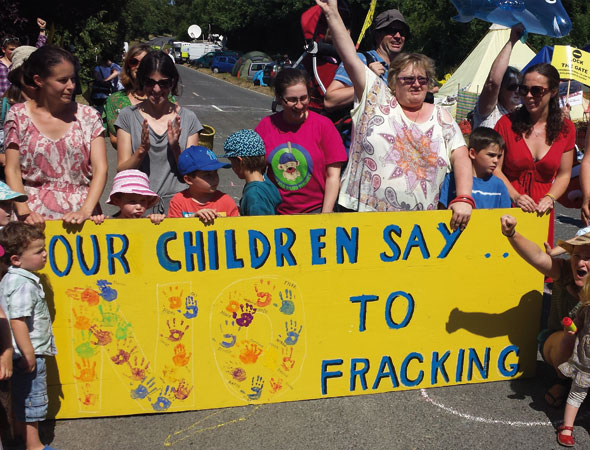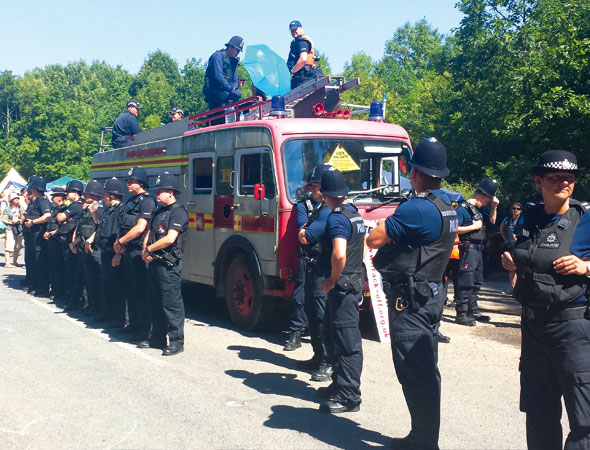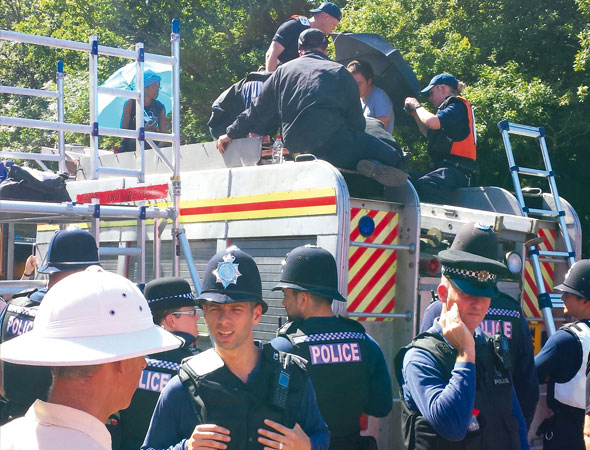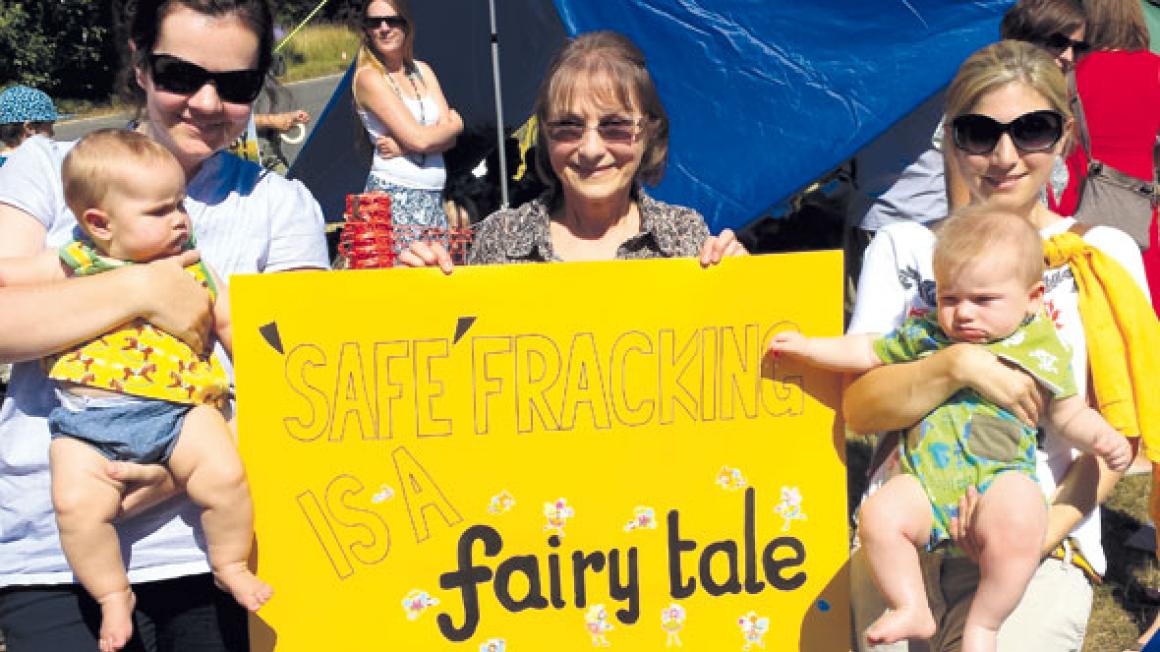The Battle of Balcombe
But this is no ordinary village fete. Listen closely and you will hear that the children are actually singing, to the tune of happy birthday, ‘No fracking in balcombe’ – while, only yards away, a line of policemen have formed a cordon across the entrance to a dirt track.
So what’s going on? Well, for the past two weeks, a growing crowd has gathered here to protest against exploratory drilling for oil near the quiet West sussex village of Balcombe. The company behind the drilling, Cuadrilla, has insisted that the process is only temporary and poses no threat to the area. The protesters, however, believe that it will lead to the company using hydraulic fracturing, or fracking, which they claim can cause dangerous water and air pollution.

It has certainly led to a lively standoff. Last week, musician Chrissie Hynde’s daughter Natalie was arrested after she superglued herself to the gate into the site. Bianca Jagger has also made an appearance, saying ‘It is important for people in this country to understand that what is happening in balcombe can happen everywhere.’
Today, protesters parked an old fire engine across the access road, before padlocking themselves to it. As the police politely go about trying to remove them, protester Liz Brown says, ‘We are here until they cut us out.’
Despite the arrests, however, this has largely been a peaceful and very British protest. As Chris Riddell, who is also a cartoonist for The Observer newspaper, reads from his book, Angus Rides The Goods Train, and sketches ‘fracking monsters’ for the children, balcombe mother-of-two Georgia Lawe tells me why she has organised today’s child-friendly storytime At The Rig event.
‘It’s an upbeat, uplifting family occasion to show that we don’t want fracking here. I come to the protest site all the time with my children – Leni, three, and Arlo, who’s nearly two – and they love it. They know all the protesters and they know the police. They came here the other night and did crazy dancing before bedtime. It’s a brilliant atmosphere.’
There is certainly a sense of carnival at the site, on the pretty country road between Balcombe and the neighbouring village of Cuckfield. Some of the protesters have pitched tents at the side of the road and a fully equipped field kitchen, stocked by fresh produce donated by local residents, provides meals. There are baskets filled with fresh peaches and apples. There’s a big bowl of pasta in pesto and someone has baked pies. Nearby, a sign offers ‘silence and meditation’ between 8am and 9am. There’s even a bagpiper.
But the protesters do have very real concerns. ‘My biggest fear is what fracking can do to our water,’ Georgia, who works in children’s book publishing, tells me. ‘This is an uninsurable technology. No one can absolutely guarantee that these wells won’t contaminate our water supply. We are a mile or so from Ardingly reservoir, which serves 80,000 households their water. It’s a terrifying proposition.’
It is certainly an issue that has attracted support from around the country. Sarah Brown, 30, has travelled from Cumbria. ‘I live relatively close to the fracking sites in Lancashire. I am here to stop fracking before it properly gets started.’ She tells me that a minibus of protesters from Lancashire is expected later in the day.
But while enthusiasm for the pro-test is palpable down at the site, how do the rest of the villagers feel?
‘The majority feeling is with the protesters,’ says Georgia. ‘I have been involved in a door-to-door survey – and we have ensured that we go to every door – and the feeling is overwhelmingly against fracking. What started as a Nimbyish reaction has now gone much deeper. They don’t want fracking anywhere.’

A 10-minute walk up the road, there is clear evidence of support for the protest in the village itself. There are anti-fracking posters in the windows of shops, private homes and cars. But there are critics, too.
‘It’s all Nimbyism along with professional protesters – they’re very disruptive,’ long-term resident Michael Dutton told the BBC. Others, meanwhile, have suggested that the campaigners are largely outsiders.
Some must also be wondering how much the stand-off is costing the local taxpayer. During my visit, I count 18 police vans, six police cars, one police motorbike and an on-site command centre.
Nevertheless, there’s certainly a strong local presence today. grandmother Pauline Evans lives in Balcombe and is at the site with her daughter Karen and baby grandson, Joseph. ‘I have only come today for the children’s event, but the mothers are very concerned about their children growing up in an area that might be dangerous,’ she says.
Alice Brown has come from nearby Haywards Heath with her young baby, Martha. ‘We just don’t know whether fracking is safe, especially for babies. You want to do everything you can to protect them,’ she says.
Cuadrilla’s chief executive, Francis Egan, has insisted that villagers have nothing to fear. ‘We’ve no intention of ruining the countryside and we won’t ruin the countryside,’ he said.
The protesters, however, remain unconvinced and have pledged to keep up the fight until the company’s permission to drill expires on 28 september.
Former chair of Lewes District Council, and one-time Page 3 model, Marina Pepper has been an enthusiastic supporter of the protest. Late last month, she was forcefully removed for peacefully blocking access to the site.

‘The Prime Minister said they were going to be the greenest government ever. We were optimistic,’ she tells me. ‘And yet they now offer tax breaks for things like this, and only help some people, most of whom seem to be related to george Osborne.
‘I am from Tory stock, but my mother, who is in her 70s and has always been a Conservative, won’t be voting for them again. They’ve lost her support.’
Whatever the outcome, the Battle of Balcombe looks like it will drag on for a few months yet. Based on today’s evidence, however, at least the local children will be having fun.
Is your village in peril? Tell us your stories at the usual Bedford Street address or via email at letters@lady.co.uk
What is fracking?
Fracking is the technique used to retrieve oil and gas from shale rock. Drilling companies have suggested that trillions of cubic feet of previously inaccessible shale gas could be extracted from parts of England.The word ‘fracking’ is shorthand for hydraulic fracturing. This process involves drilling into the earth and injecting a mixture of water and chemicals at high pressure into the rock to release the gas or oil, allowing access to hard-to-reach sources of these fuels.
The controversy surrounding fracking stems from environmental concerns. Firstly, the cost of transporting water to fracking sites is high. There are also fears that carcinogenic chemicals used may escape into the groundwater.
Campaigners also fear it can cause earth tremors – two small earthquakes hit the Blackpool area following fracking in 2011. Environmental campaigners state that fracking is preventing energy firms from pursuing and investing in renewable sources of energy.


